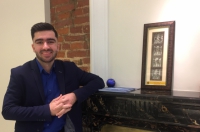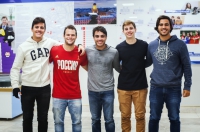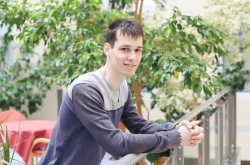Why did you decide to come to study in Russia? And why ITMO?
When I first began my studies here, I was very worried – I was about to meet a new culture, new mentality, in a completely new place; but that is exactly what inspired me and made me happy later on. One of the main reasons I chose ITMO was that I’d already studied in my home country and wanted to experience a different education system. To me, this was a place where I had the chance to try out new subjects, to study them in new ways, and learn to be independent. I thought – why not plunge into a completely different education system with a renowned research university in Russia? Why Russia, though? There are two reasons: I like the climate and the culture.
How did your studies start?
During my first semester, I’d learned a lot of new things – I had never learned about Big Data, or data analysis in general, before. Thanks to ITMO, I got the opportunity to familiarize myself with the most important technologies – in terms of how they may affect my career as a programmer. This was a great adventure which left me with a great number of important skills. September 15 2015 was a big day for me: that was the first time I’d ever gone to study abroad.
I must admit, the first few weeks were tough; I knew very little Russian, but my passion for this educational adventure got me through the difficult parts. I learned something new every day – not just in regards to a subject or technology; I’m talking about culture, information, many other things.
Was there something especially memorable?
I often recall the time I just started studying in Russia – it impresses me how much I’ve learned since. I love to think back to how I got over the initial difficulties. I’d encounter challenges – in both education and in everyday life, and I’d feel joy at finding solutions to them. To be honest, I never expected to acquire as much experience at ITMO as I did. I also had a lot of help from each of my new friends and professors. Education here is well-organized and employs modern technologies; the curriculum, judging by my own experience, is relevant to today’s job market. One of the most important things I learned at the university was the importance of finding something you need in a short amount of time in a completely new manner than the one I’d been used to.
Overall, during my stay at the university, I learned not only about Big Data and high-performance computing – I also gained knowledge which opened my eyes to new things and and motivated me to pursue a career in this field. Before I came to ITMO, I possessed a completely different approach and knowledge of programming – a more scientific one; I lacked practice and real-life application. In Russia, taking part in research projects, I learned the one true method – put everything into practice and also learned about new technologies and methods in programming.
What is the benefit of getting a Master’s degree in your field?
My degree isn’t just about data analysis. You actually learn about a bunch of technologies that are crucial if one wants to work as a data analyst or programmer. We’ve seen how many various job positions there are on the IT market lately. At ITMO University I’ve acquired some very unique skills that make me stand out among other specialists. In other words, my Master’s degree in Big Data and high-performance computing greatly increases my chances of getting a job in other areas of IT that might not have been accessible to me before. Any technology can be applied anywhere – we just have to know how to do that.
All in all, a double degree opens a lot more doors than a regular one does. Still, everything depends on the student – where they choose to apply their knowledge and, indeed, how much they really got from their education. What matters is that a double degree always provides one with the experience of working in different cultures. I think it’s a great thing for a career, as it gives a more complex understanding of a subject.
Tell us: what is it you do now and what do you plan to do?
Before I came to Russia, I worked as a web developer. I’m not working right now, as I plan to come back to ITMO for my postgraduate studies. I’d also like to conduct a large-scale research project and combine all my skills to discover or develop something that may be used in real life and solve real issues. Besides, I want to work in Russia. One of my main reasons for that is that it has a very international work culture and a great deal of international companies have representatives here. Surprisingly enough, I enjoy the climate, too. When I tell people about St. Petersburg, I use the word “magical”. The history, the museums, the culture – this is what makes me come back to Russia again and again.
Have you figured out what a graduate should do not to lose their grasp on what they’ve learned after they’ve graduated?
This depends on a few things. If you’re studying and you learn about new things at university, then it’s better to test them by creating a small project prototype on your own – something you might later recreate on a bigger scale. This is because a lot of companies aren’t interested in accepting applicants who only have basic knowledge and have them work in one specific area. As for me, I’d worked on numerous small projects and tried to involve as many new technologies as possible. I think, for a student, this is the best way to practice, as even in a small project they can apply all the new things they’ve learned about during their studies – although some can be time-consuming. On the other hand, even if you manage to get an internship with a company somewhere, it is not a guarantee that you will acquire actual skills. This is why it’s important for a young specialist to experiment with new things on their own.
However, this method is only applicable to those who can learn fast and who already have a solid basic knowledge of programming. Newbies might find it difficult.
What advice would you give to other international students who come to ITMO?
Make sure to understand how the educational system here works – it’s very rewarding once you learn how to use it properly. Here, students don’t just learn about technologies, but also the small yet vital tricks of the trade that will help pave the way to success. Many are ambivalent about encountering a new system of education. Speaking from my own experience, I’ll say that all my professors always helped me when I struggled with something. Reach out, and you’ll always find help or advice.
Each country has its own educational system. But I can’t say that they’re all completely different or that others cannot be compared to whichever one you’re used to. That’s wrong – there are always similarities.
Finally: higher education abroad isn’t just about education. It’s an opportunity for self-development: to reconsider what you know, your skills, your culture; to try a different culture and profit from this intellectual richness as part of the international community. Oh, and one more thing – watch out for the Russian winter and stock up on warm clothes!





